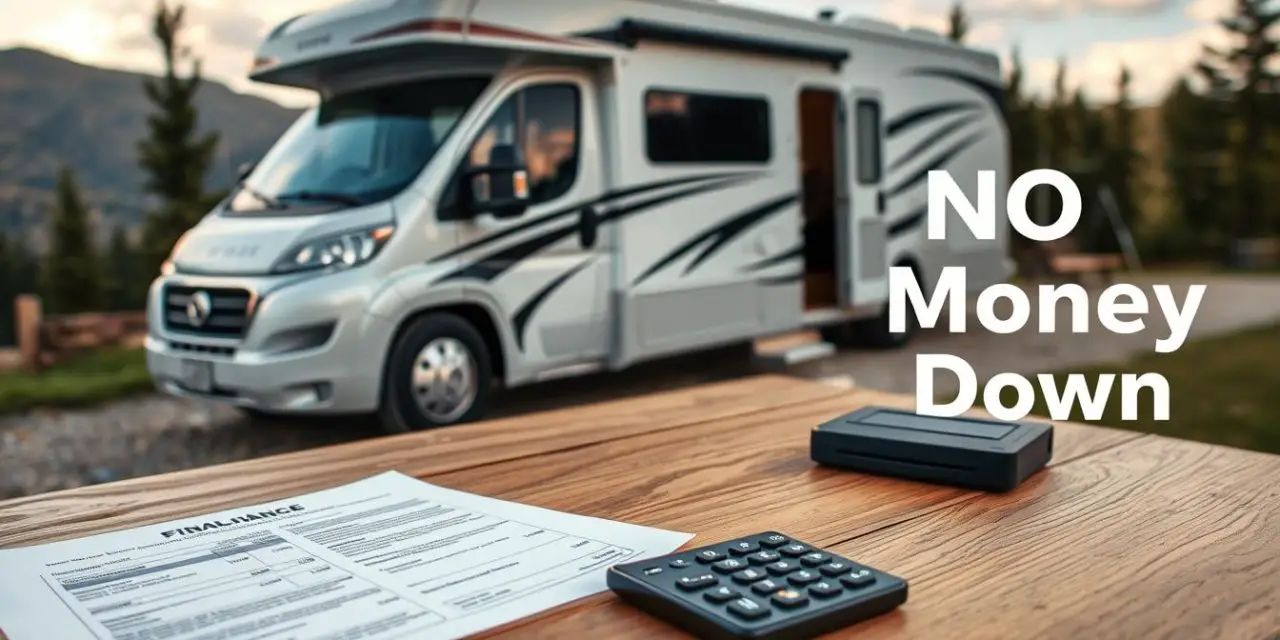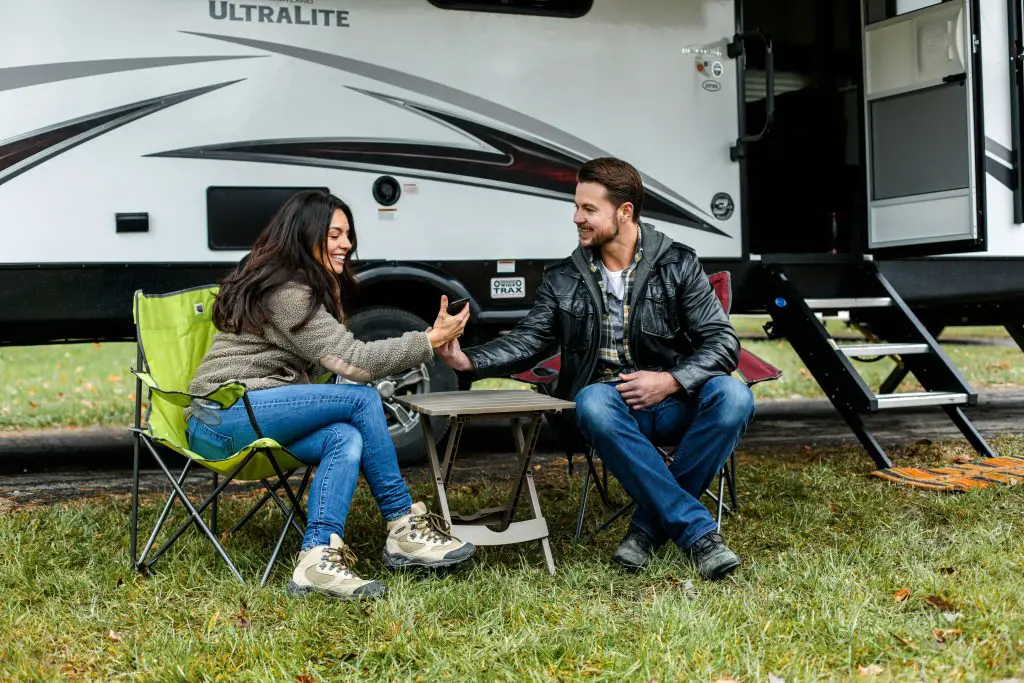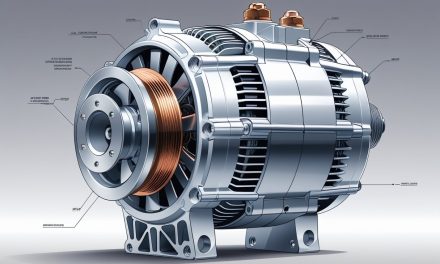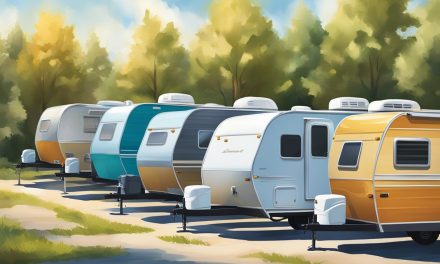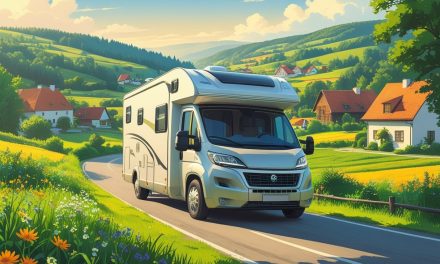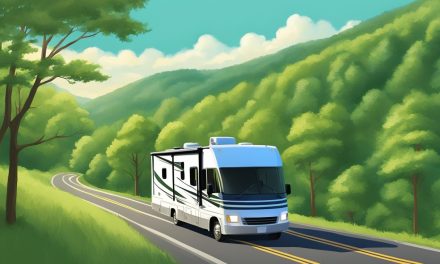The short answer is yes—you can buy an RV with no money down, but there are important qualifications, trade-offs, and alternatives to consider before taking this route.
In this comprehensive guide, we’ll explore the reality of zero-down RV financing, including who qualifies, what it costs in the long run, and whether it’s the right choice for your financial situation. We’ll also look at alternative approaches that might better serve your needs if traditional zero-down financing isn’t available to you.
What Does “No Money Down” RV Financing Really Mean?
When lenders or dealerships advertise “no money down” RV loans, they’re offering to finance 100% of the purchase price without requiring an upfront payment. This means you can drive off the lot with a new or used RV without paying anything that day—but it doesn’t mean the purchase is any less expensive. In fact, zero-down financing typically comes with higher costs over the life of the loan.
Zero-down financing differs significantly from traditional RV loans, which usually require 10-20% of the purchase price as a down payment. For a $50,000 RV, that’s $5,000-$10,000 upfront—a substantial sum that many buyers don’t have readily available.
The Difference Between Zero Down and Low Down Payment Options
It’s important to distinguish between truly zero-down financing and low down payment options:
- Zero Down: No initial payment required; the loan covers the entire RV price.
- Low Down Payment: A small percentage (typically 5-10%) is required upfront.
Both options make RV ownership more accessible initially, but they have different qualification requirements and long-term financial implications.
Pros and Cons of No Money Down RV Loans
Advantages
- Immediate access to an RV without saving for years
- Preserves cash for emergencies or travel expenses
- Allows you to start enjoying RV lifestyle sooner
- No large upfront financial commitment
Disadvantages
- Higher monthly payments throughout the loan term
- Greater total interest paid over the life of the loan
- Risk of negative equity (owing more than the RV is worth)
- Typically requires excellent credit and stable income
- Fewer lender options available
How to Qualify for No Money Down RV Loans
Qualifying for a zero-down RV loan is more challenging than standard financing. Lenders take on additional risk when financing 100% of the purchase price, so they compensate by setting stricter qualification standards.
Would you like to save this article?
Credit Score Requirements
Your credit score is the most critical factor in qualifying for zero-down RV financing. While standard RV loans might be available to borrowers with credit scores in the 600s, zero-down options typically require:
- Excellent credit (typically 700+)
- Clean credit history with no recent late payments
- Established credit history (several years of credit use)
- No recent bankruptcies or foreclosures
Some specialized lenders may offer programs for scores as low as 660, but these often come with significantly higher interest rates that increase the overall cost.
Income and Debt-to-Income Ratio
Lenders will carefully evaluate your income stability and debt-to-income ratio (DTI). For zero-down RV loans, most lenders require:
- DTI ratio under 43% (some premium lenders require under 36%)
- Stable employment history (typically 2+ years in the same field)
- Verifiable income sufficient to cover the loan payments
- Adequate reserves (savings) to cover potential emergencies
Your DTI is calculated by dividing your total monthly debt payments by your gross monthly income. Lower ratios demonstrate that you have more available income to handle the new RV payment.
Documentation Requirements
- Proof of income (pay stubs, tax returns, W-2s)
- Bank statements (typically 2-3 months)
- Employment verification
- Residence history
- Personal identification
- Insurance information
The documentation requirements are often more extensive for zero-down loans because lenders need additional assurance that you can manage the payments.
RV Loan Options with No Down Payment
Dealer Financing vs. Bank or Credit Union Loans
Zero-down RV financing is available through several channels, each with distinct advantages and disadvantages:
| Financing Source | Advantages | Disadvantages | Typical Requirements |
| Dealer Financing | Convenient one-stop shopping; Special promotions; May be more flexible with credit | Usually higher interest rates; May include hidden fees; Limited negotiation power | Credit score 660+; DTI under 45%; Proof of income |
| Banks | Competitive rates; Established relationship may help; Pre-approval strengthens negotiating position | Stricter qualification standards; Longer approval process; May not specialize in RV loans | Credit score 700+; DTI under 43%; 2+ years employment history |
| Credit Unions | Often lowest interest rates; Member-focused service; More flexible terms | Membership required; May have limited RV loan experience; Potentially slower processing | Credit score 680+; DTI under 45%; Membership in good standing |
| Online Lenders | Fast application process; Specialized in RV financing; Convenient digital experience | Potentially higher rates; Less personalized service; May have additional fees | Credit score 660-700+; DTI under 50%; Digital verification methods |
Special Financing Programs and Promotions
Some manufacturers and dealerships offer special zero-down financing promotions, particularly for new models or during slow sales periods. These may include:
- Seasonal promotions (often in fall/winter)
- Model year-end clearance events
- Manufacturer-subsidized financing
- First-time buyer programs
While these promotions can provide genuine opportunities, carefully read the fine print. Some may include deferred interest that accumulates if not paid within a promotional period, or balloon payments due at the end of the loan term.
Can You Get Approved with Bad Credit and No Money Down?
The combination of bad credit and no down payment creates significant challenges for RV financing, but it’s not always impossible. Your options will be more limited and likely more expensive.
Subprime RV Loans
Some lenders specialize in subprime RV loans for borrowers with credit scores below 650. These typically come with:
- Significantly higher interest rates (often 15-20% or more)
- Shorter loan terms (reducing lender risk)
- Smaller maximum loan amounts
- Possible requirement for a co-signer
With bad credit, a zero-down loan becomes even more expensive, potentially adding thousands of dollars in interest over the life of the loan.
Buy-Here-Pay-Here Dealers
Some RV dealers offer in-house financing with “Buy-Here-Pay-Here” (BHPH) arrangements. These dealers:
- Make credit decisions themselves rather than using third-party lenders
- Often focus on payment amount rather than purchase price
- May not check credit or may have minimal credit requirements
- Typically charge the highest interest rates in the market
While BHPH dealers may offer zero-down options to buyers with poor credit, they compensate for the risk with very high interest rates and sometimes inflated vehicle prices.
Alternatives for Low-Credit Buyers
If you have bad credit and can’t qualify for zero-down financing, consider these alternatives:
- Save for a substantial down payment (20%+) to offset credit concerns
- Find a qualified co-signer with good credit
- Consider a less expensive, used RV to reduce the loan amount
- Work on improving your credit score before applying
- Look into RV rentals until your financial situation improves
Alternatives to Traditional Zero-Down RV Loans
If you can’t qualify for a zero-down RV loan or want to avoid the additional costs, several alternatives can help you achieve your RV lifestyle goals.
Home Equity Loans or Lines of Credit
If you own a home with equity, this can be an attractive financing option:
- Generally lower interest rates than RV loans
- Potential tax deductibility of interest (consult a tax professional)
- Longer repayment terms available
- Less stringent qualification requirements than zero-down RV loans
The primary downside is that your home serves as collateral, creating risk if you can’t make payments.
Personal Loans
Unsecured personal loans can be used for RV purchases, particularly for less expensive models:
- No collateral required (the RV itself isn’t at risk of repossession)
- Faster application and funding process
- Fixed interest rates and payment amounts
- No specific RV-related requirements or restrictions
However, personal loans typically have higher interest rates than secured loans and lower maximum loan amounts, making them better suited for less expensive RVs.
RV Rentals and Peer-to-Peer Sharing
Before committing to ownership, consider whether renting might better meet your needs:
- Try different RV types before buying
- No long-term financial commitment
- No maintenance, storage, or insurance concerns
- Ability to rent exactly the right RV for each specific trip
Platforms like RVshare and Outdoorsy connect RV owners with renters, often at lower rates than traditional rental companies.
Save for a Down Payment
Sometimes the best alternative is patience. Saving for a down payment offers significant benefits:
- Better loan terms and lower interest rates
- Reduced monthly payments
- Less total interest paid over the loan term
- Immediate equity in your RV
- Demonstrates financial discipline to lenders
Even saving for a 10% down payment can significantly improve your financing options and long-term costs.
Final Thoughts: Should You Buy an RV with No Money Down?
Buying an RV with no money down is possible for qualified buyers, but it comes with significant trade-offs that should be carefully considered. The decision ultimately depends on your financial situation, credit profile, and RV lifestyle goals.
When Zero-Down Financing Makes Sense
No-money-down RV financing might be appropriate if:
- You have excellent credit and stable, high income
- You’ve found a special promotional rate that minimizes the interest premium
- You need to preserve cash for other purposes (emergencies, renovations, etc.)
- You plan to keep the RV long enough to build equity and potentially refinance
When to Consider Alternatives
You might want to explore other options if:
- Your credit score is below 700
- Your debt-to-income ratio is already high
- You can only qualify for very high interest rates
- You’re concerned about being underwater on the loan
- You’re not certain about long-term RV ownership
Remember that RV ownership involves more than just the purchase price. Budget for insurance, maintenance, storage, fuel, and campground fees when determining what you can truly afford.
By understanding the realities of zero-down RV financing and carefully assessing your financial situation, you can make an informed decision that balances your desire to hit the road with your long-term financial health. Whether you choose zero-down financing or one of the alternatives discussed, the key is finding a solution that allows you to enjoy the RV lifestyle without creating undue financial stress.

